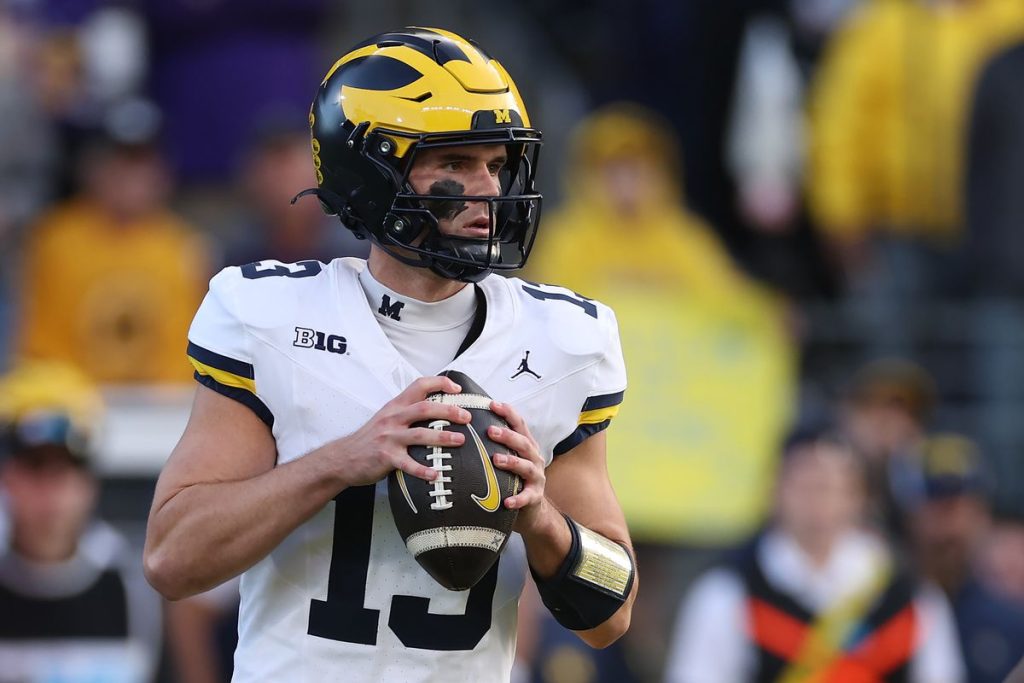Michigan QB Jack Tuttle retires from football, citing concussions – the second college QB to do so in less than a week
3 min read

Michigan Wolverines quarterback Jack Tuttle announced his retirement from football on Monday, citing concussions and other health concerns. His decision marks the second time in less than a week that a college quarterback has stepped away from the game for similar reasons.
Tuttle, a seventh-year senior, previously played four seasons with the Indiana Hoosiers before transferring to Michigan in anticipation of their 2023 national championship campaign. In a heartfelt post on X (formerly Twitter), he shared that his choice followed “deep reflection and heartfelt conversations with my family, doctors, and loved ones.”
In his announcement, Tuttle elaborated on the challenges he faced over the past year, including a UCL repair in his throwing arm that hindered his recovery and led to ongoing complications. “Unfortunately, the recent experience of enduring my fifth concussion has brought forth the painful truth: that I need to start prioritizing my health,” he wrote. Tuttle’s career has been plagued by numerous injuries, culminating in this tough decision to walk away from the sport he loves.
At 25 years old, Tuttle played in two games for the Wolverines this season, contributing to a roster that has seen multiple starting quarterbacks. Despite stepping away from playing, he expressed a desire to remain connected to football, hoping to pursue a career in coaching.
This announcement follows the retirement of North Carolina State quarterback Grayson McCall, who also cited concussion concerns. McCall revealed his decision on October 23, stating, “As you all know, I have battled injuries my whole career, but this is one that I cannot come back from.” He emphasized that after discussions with brain specialists and his family, it was in his best interest to retire.
The recent retirements of these college quarterbacks shine a light on the significant risks associated with football. The sport has long struggled with issues related to concussions, prompting some players to pledge to donate their brains for scientific study after their deaths, aiming to understand the long-term effects of repeated head injuries.

Tuttle’s departure from the field is particularly poignant given the physical demands placed on college athletes. As one of three starting quarterbacks used by Michigan this season, he made significant contributions, including playing in a high-stakes game against the University of Washington and starting against the University of Illinois, which resulted in a 21-7 loss for the Wolverines.
The decision by Tuttle and McCall reflects a growing awareness among athletes regarding the importance of mental and physical health. Concussions can have serious long-term consequences, leading many players to reconsider their futures in the sport. As awareness around head injuries increases, it may prompt more athletes to prioritize their health over the game.
As Tuttle transitions away from active play, he joins a growing conversation about the need for greater safety measures in football at all levels. His hope to remain involved in the sport through coaching could allow him to influence future generations of players, advocating for health and safety while sharing his passion for the game.
The ongoing discussions around concussions and player safety are crucial as football continues to evolve. With increasing scrutiny from medical professionals and the community, it is essential for colleges and organizations to implement stronger protocols to protect athletes.
In conclusion, Jack Tuttle’s retirement serves as a reminder of the toll that injuries can take on college athletes. By prioritizing health and sharing their experiences, players like Tuttle and McCall are paving the way for a more thoughtful approach to player safety in football. Their decisions not only impact their own futures but also contribute to a broader dialogue about the responsibilities of teams, coaches, and leagues in safeguarding the well-being of their athletes.